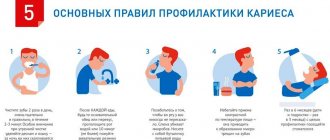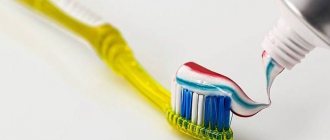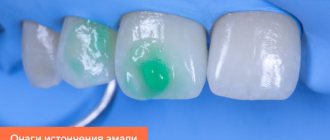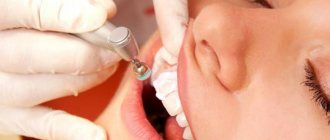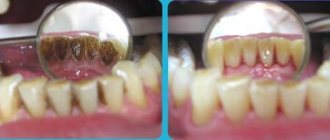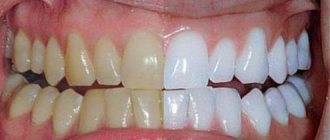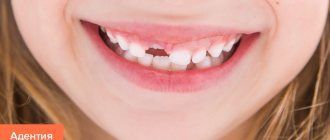According to statistics, caries occurs more often in children than in adults. This is one of the most common reasons for visiting a dentist, because not only permanent teeth, but also baby teeth are susceptible to destruction.
Children do not like to be treated, and often parents feel sorry for the child until the last moment and do not take him to the dentist in order to avoid stressful situations. But you need to understand that the health of his teeth in adulthood will depend on how they care for their baby’s oral cavity in childhood.
What are the causes of caries in children
The appearance of caries can be due to various reasons.
Insufficient or incorrect hygiene
Children most often do not want to brush their teeth - they are capricious because they do not like the process itself or the taste of the toothpaste. And parents often follow the lead and let the situation take its course, without insisting on the need for this procedure. However, it is necessary to teach a child to brush their teeth from a very early age, so that by the age of two the child himself shows a desire to take care of his teeth. Dentists recommend starting caries prevention immediately after the first teeth erupt.
Prolonged contact with the pacifier
In dentistry there is such a thing as “bottle caries”. It can develop before the age of 1 year, when the child is fed too long and often from a bottle with a nipple. Most often, such caries affects the upper front teeth, and the consequences are really serious.
Transmission of infection from parents
Many people are familiar with the situation when a child suddenly dropped a pacifier on the floor, the mother quickly picked it up, licked it and returned it to the baby. It's not as harmless as it might seem. This is how bacteria are transmitted that cause caries. For the same reason, you should not lick the baby's spoon when feeding. The infection can be transmitted even through kissing, so parents and other relatives who are in close contact with the child should carefully monitor the health of their teeth.
Congenital problems
Often, dental problems are congenital in nature. This may be genetic or caused by health problems in the mother during pregnancy. Bad habits, past illnesses, deficiency of vitamins and minerals (especially calcium) - all this affects the dental health of the unborn baby.
Abuse of sweets and carbohydrate foods
This is the most common cause of dental caries. Too much love for sweets is not good for children's teeth. Sweets, juices, lemonades, buns and cookies - all this creates a favorable environment for the development of bacteria and subsequent destruction of enamel.
Lack or excess of fluoride
Fluoride is necessary for the normal formation of teeth and to protect them from damage. We get it from food and water, and it is better to periodically get tested for the content of this element in the body in order to adjust nutrition and care in a timely manner. Both deficiency and excessive amounts of fluoride provoke dental problems.
When your child has permanent teeth, it is advisable to make a special visit to the dentist.
To carry out another very useful procedure - sealing the grooves (fissures) of the teeth . It is advisable to do this procedure within a year and a half from the moment the molars erupt. As a result, after eating, plaque with bacteria that destroy the enamel will not accumulate on the chewing surface of the teeth. During the procedure, the doctor cleans the teeth with a brush and paste, and then applies an acidic substance to the grooves and pits on the surface of the teeth. After this, a sealant is applied to the tooth, which flows into the micropores of the enamel and solidifies there under the influence of a special lamp. The sealant not only seals the tooth, but also saturates the tooth enamel with fluoride, magnesium, and calcium ions for a long time.
So, a multi-year program to save children’s teeth from caries has been built. You did everything you were supposed to, and you can rightfully be proud of yourself.
Based on materials from the site www.womandent.ru
What are the stages of dental caries in children?
Tooth decay begins gradually, and with regular examination, parents and the dentist can catch the right moment in time and begin treatment.
| Initial stage Specks appear on the enamel, which differ in color from the rest of the tooth, and over time they darken. | Superficial caries The tooth decay is still minor, but the child is already beginning to react to hot and cold. | Average caries A carious cavity appears at the site of enamel destruction; the tooth reacts very painfully to the temperature of food and drinks. | Deep caries The last stage is when not only the enamel is destroyed, but also the tooth tissue itself. If treatment measures are not taken, then inflammation of the pulp will gradually begin, and the tooth will have to be removed. |
It is better not to delay the examination, because caries in a child can develop quite quickly. The further you go, the more uncomfortable and worrying your first visit to the doctor will be.
Sources
- Wang Z., Rong W., Xu T. Effect of Fluoride Varnish in Caries Prevention on Permanent First Molars: A 36-Month Cluster Randomized Controlled Trial. // Pediatr Dent - 2021 - Vol43 - N2 - p.82-87; PMID:33892830
- Godhi BS., Kaul S., Shanbhog R. Knowledge, attitude, and practices of grassroot health workers about early childhood caries. // Public Health Nurs - 2021 - Vol - NNULL - p.; PMID:33890686
- Jayakaran TG., Rekha CV., Annamalai S., Baghkomeh PN. Salivary peptide human neutrophil defensin1-3 and its relationship with early childhood caries. // Dent Res J (Isfahan) - 2021 - Vol17 - N6 - p.459-464; PMID:33889352
- Chaurasiya A., Gojanur S. Evaluation of the clinical efficacy of 38% silver diamine fluoride in arresting dental caries in primary teeth and its parental acceptance. // J Indian Soc Pedod Prev Dent - 2021 - Vol39 - N1 - p.85-89; PMID:33885393
- Ranjana BS., Chowdhary N., Kiran NK., Chaitan SM., Reddy VR., Prabahar T. Remineralization efficacy of nonfluoride versus herbal-based pediatric dentifrice in demineralized primary teeth. // J Indian Soc Pedod Prev Dent - 2021 - Vol39 - N1 - p.67-73; PMID:33885390
- Durhan M.A., Ozsalih S., Gokkaya B., Kulan PY., Kargul B. Caries Preventive Effects of Theobromine Containing Toothpaste on Early Childhood Caries: Preliminary Results. // Acta Stomatol Croat - 2021 - Vol55 - N1 - p.18-27; PMID:33867534
- Valadas LAR., Lobo PLD., Fonseca SGDC., Fechine FV., Rodrigues Neto EM., Fonteles MMF., de Aguiar Trévia LR., Vasconcelos HLP., Lima SMDS., Lotif MAL., Fernandes AMB., Bandeira MAM. Clinical and Antimicrobial Evaluation of Copaifera langsdorffii Desf. Dental Varnish in Children: A Clinical Study. // Evid Based Complement Alternat Med - 2021 - Vol2021 - NNULL - p.6647849; PMID:33833817
- Arora A., Lucas D., To M., Chimoriya R., Bhole S., Tadakamadla SK., Crall JJ. How Do Mothers Living in Socially Deprived Communities Perceive Oral Health of Young Children? A Qualitative Study. // Int J Environ Res Public Health - 2021 - Vol18 - N7 - p.; PMID:33805307
- Karamehmedovic E., Bajric E., Virtanen JI. Oral Health Behavior of Nine-Year-Old Children and Their Parents in Sarajevo. // Int J Environ Res Public Health - 2021 - Vol18 - N6 - p.; PMID:33800979
- Schulz-Weidner N., Logeswaran T., Jux C., Schlenz MA., Krämer N., Bulski JC. Evaluation of the Effectiveness of an Interdisciplinary Preventive Oral Hygiene Program for Children with Congenital Heart Disease. // Int J Environ Res Public Health - 2021 - Vol18 - N7 - p.; PMID:33800550
Is it necessary to treat caries of baby teeth?
Despite the “temporary nature” of children’s teeth, treatment and care for them must be thorough and complete. Chronic inflammation in the oral cavity leads to serious problems.
- A baby tooth affected by caries can decay so deeply that it affects the germ of a permanent tooth. The infection will spread to it, and it will grow up with enamel defects or simply die.
- When a baby tooth is removed, the adjacent tooth moves into its place, causing the permanent tooth to erupt in a different place than intended. As a result, the bite is formed incorrectly, and in the future it has to be corrected with braces.
- Advanced caries reduces immunity and causes ENT diseases and even allergies.
- Painful sensations prevent the baby from biting and chewing food correctly, which causes digestive problems.
- The child will be embarrassed about his bad teeth, which will prevent him from communicating with his peers.
It is necessary to treat caries at any age at the initial stage, and it is better to accustom your child to this in advance.
Methods to prevent the development of the disease
After establishing the cause of this disease, you can begin to take preventive measures. Prevention of caries in preschool children includes:
- reducing the amount of sweets, lollipops, chocolate and baked goods;
- teaching the child the rules of oral hygiene;
- dieting.
These rules are quite simple to follow. The only thing that is absolutely necessary is the desire of the parents. Prevention of caries in school-age children is practically no different from that in preschool children. The only thing is that the child should not be taught the rules of oral hygiene, but should be monitored for their implementation. The NovaDent clinic in Moscow hopes that preventing caries in baby teeth will become the responsibility of every family member. But if the disease does manifest itself, treating children’s dental caries will not take a lot of money and effort, since prices for services are affordable, and the professionalism of doctors is beyond doubt.
Expert of the article you are reading: Lapshina Maria Aleksandrovna Dentist, pediatrician
20 years
Clinical experience
Krasnogorsk
Moscow region, Krasnogorsk, Podmoskovny Boulevard, 5
+7
Free consultation with this specialist
Can a filling be placed on a baby tooth?
If the doctor diagnoses not the first stage of tooth decay and insists that it is necessary to put a filling, it is better to agree with him. This is the fastest and most reliable way to solve the problem of infection and protect permanent teeth.
Modern filling materials are as safe as possible for children’s teeth. Depending on the stage of caries, the doctor will select a suitable filling option. Before installing a permanent filling, the dentist may place a temporary filling for several days to fix the medication inside the diseased tooth.
If the damage is not yet serious, the doctor will limit himself to preventive measures. There are different approaches and tools for different problems.
School dentist
In this case, the work of a pediatric school dentist is very important. It is the school pediatric dentist who must competently convey to parents and children how important preventive dental examinations and timely treatment of caries are. In principle, schools currently provide entire treatment and preventive programs. Participation in them is not strictly obligatory and the decision to participate in these programs, of course, is made by parents. If you decide to refuse the services of a school dentist, we advise you to definitely find a good pediatric dentist, since in any case, healthy teeth are the result of the right approach to treatment and preventive monitoring of their health.
What are the treatment methods for caries in children?
Treatment methods depend on the stage of caries development. The more serious the problem, the longer it will take to fix it.
Preventive
At the initial stage, a delicate intervention is sufficient, which can stop or reverse the process of destruction that has begun. In this case, for example, remineralization (treatment of teeth with a solution of calcium and fluoride) or deep fluoridation (treatment with fluoride) is used. Such procedures are carried out in courses until the condition of the teeth is stabilized.
There is also a treatment method without drilling, which allows you to quickly and completely painlessly prevent the development of inflammation. The procedure is suitable for children from 4–5 years of age and causes them minimal discomfort.
Medicinal
For medium and deep caries, classical filling with preliminary preparation of teeth for the procedure is already necessary. To ensure that the treatment is calm and painless, the most modern and effective anesthesia is used. Your baby doesn’t even have to endure the pain of the needle because the injection site is first numbed. The drill is used to a minimum in the treatment of childhood caries - if something can be done manually, then the doctor will do so.
If a child has a complex case of caries, or is very restless in the dentist's chair, treatment is carried out under anesthesia. After consulting with an anesthesiologist and passing all the necessary tests, the baby will be selected the appropriate drug and dose, he will be put into deep sleep, during which the doctor will carefully monitor the condition of the body. Time will fly by in a dream - the child will wake up with healthy teeth, a clear head and an unspoiled mood.
How to prevent tooth decay in children
The best way to combat tooth decay is prevention. To maintain the health of children's teeth, you need to follow several rules.
- Follow your diet. Reduce your consumption of sweets as much as possible. Make sure your child gets enough calcium from their diet - dairy products, nuts, legumes and sesame are especially rich in it.
- Teach your child to brush their teeth. From the first tooth that emerges (age 6–8 months), you can already use a small baby brush. Gradually accustom your child to self-care - buy tasty toothpaste, turn the process of brushing your teeth into a game, encourage your baby’s interest.
- Visit your dentist regularly. Children need to undergo preventive examinations, as well as professional hygiene procedures more often than adults - approximately once every three months. The doctor will be able to identify problems in a timely manner and give advice on the proper care of children’s teeth. In addition, visits to the doctor will become routine for the baby, and he will not be afraid of them.
Try to carefully monitor the condition of your child’s teeth and pay attention to his complaints. The sooner you see a dentist, the faster, more effective, and most importantly, painless the treatment will be. Explain to your child that dentistry is not scary. And our experienced doctors will help him make sure of this.
Endogenous prevention
This method is aimed at improving the condition of teeth from the inside. Prevention involves adjusting the nutritional system and taking additional mineral complexes (fluoride-containing preparations; vitamins A, D, C, B1, B6, etc.). Parents should exclude sweets and soda from their child’s diet or reduce their consumption as much as possible. Solid fruits and vegetables are a good substitute and are excellent for cleaning the mouth. Consumption of dairy products rich in calcium is also an excellent prevention of caries.
